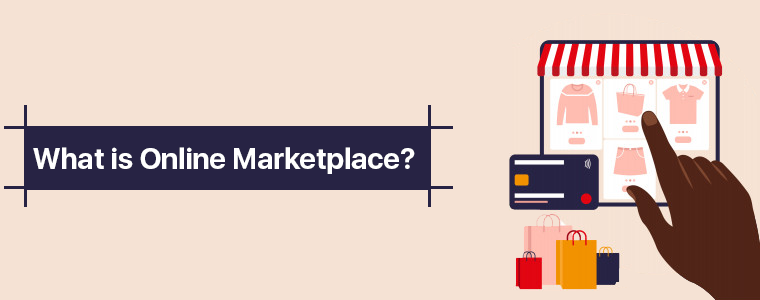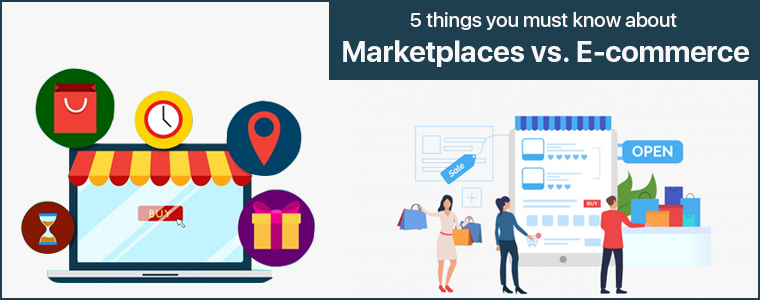The marketplace is the new wave in the business industry while eCommerce has been a part of the business world for two decades. Most people think that selling over an online marketplace and eCommerce are the same things.
In reality, the marketplace and eCommerce have a few similarities like the digital platform, of course, both are websites to sell products but when speaking about the marketing approach, scalability, product choices, target audience, and other technical aspects, online marketplace and eCommerce follows entirely different approaches.
In this article, we’ll discuss one of the most common conundrum vendors faces when they want to take their products online – namely, whether it’s worth selling your products via e-commerce vs. marketplace.
What is Online Marketplace?

A marketplace is in the simplest words, a website where the goods sold come from different sellers. Much as a shopping mall does in real life, the range of assortments a marketplace offers is exactly what draws consumers.
It’s disarmingly easy to set up your store in most marketplaces; some even let you sign up with your Facebook account. You can sell on the world’s famous marketplaces like Amazon, Etsy, eBay, Otto, etc.
What is an E-commerce store?
E-Commerce is a marketplace where several consumers sell their products/services to a single seller. There are only two people involved in the sales process, the seller and the buyer, as the website belongs to the retailer.
Unlike markets, which ensure that their sites are always robust and up-and-running, the seller needs to set up and maintain e-commerce websites.
Online Marketplace vs. E-commerce website
Online traffic is one of the main differences as the marketplace has a greater audience base in comparison to the eCommerce website. As the marketplace has multiple sellers and product choices, greater are the chances of having a large customer base.
Marketplaces have always been transaction-oriented and the aim is to align buyers and vendors with each other. Marketplaces also concentrate solely on pushing consumers towards transactions and vendors to list more goods or services. In reality, network effects favor marketplaces: more buyers attract more sellers and vice versa.
Here are the top 5 things about the online marketplace and eCommerce you should know:
Inventory management
It is apparent that the larger the stock, the more likely a customer would be to find what they are searching for. But there is a pit that you must escape.
You need to deal with attracting and holding customers to your website. Internet users can opt to buy directly on the seller’s website, so day after day, you need to create customer loyalty.
To manage your inventories on Amazon, ETSY, eBay, Walmart, etc., you can use various integrations available. The marketplace integrations help you handling inventories and other functionalities in a hassle-free manner.
The eCommerce website involves a lot of time and effort for inventory management as there is only one seller and customer engagement is sometimes very high due to which products may go out of stock. It ultimately affects the bounce rate.
Greater volume sales in the marketplace
The margins for each transaction are smaller in marketplaces relative to e-commerce transactions. This is because it mostly deducts income from the commissions it receives from sales. As a consequence, marketplaces need to offer more goods than e-commerce websites do.
It is therefore a matter of dealing with a lot more transactions, for which it is important to place as much focus as possible on the automation of their processes.
The margins for each transaction are smaller in marketplaces relative to e-commerce transactions. This is because it mostly deducts income from the commissions it receives from sales. So the more transactions you have on your side, the more profits you have.
Marketing strategies and targeting

Marketplace helps the marketing activities of sellers through the attraction, nurturing, and interaction of leads on the web. Marketplaces have their marketing plans and you just have to register or take a membership plan to start selling.
But for an eCommerce website, the seller needs to take care of generating/nurturing him/herself with lead.Since you are your website’s owner, it can be said that it is your responsibility. You have to handle the whole show by identifying keywords, devising marketing plans, promotions, and other items. You would need several dedicated jobs for it. You are free in the marketplace from this pressure.
But you can share the same with some eCommerce marketing experts because you have the necessary data and stay focused on promoting your website.
It is difficult to engage audiences in the e-commerce market. It’s time-intensive and costly. You can always be approaching the wrong individuals, even after you gain some experience. Different social media such as Facebook will greatly assist in engaging the public.
Cost involved
A marketplace will make it possible for its users to benefit from slack properties. These are already owned but not fully used properties, which mean marketplaces, will produce good consumer value for the marketplace operator with far less outlay. The owners of the property profit from something they can’t use all the time so they get greater utility. Consumers often profit because they get access to anything they couldn’t afford otherwise.
Traditional e-commerce typically needs someone to buy enough stock, otherwise, consumers face long lead times as items are dropped from the wholesaler’s storefronts. But on the flip side, only the buyer uses the products that are sold and they can be assured of unlimited availability. A good option for a single brand selling its stock is conventional e-commerce.
Is trust a major concern?
You must create confidence in both a marketplace and e-commerce to sell online.
Your users need to trust each other and your website. 67% of consumers rely on a familiar marketplace for a purchase even if they are unfamiliar with the merchants selling the commodity. If consumers have had a satisfying experience, 54% will return to purchase from the same marketplace again and trust is a key component of this experience.
In traditional eCommerce stores, customers feel intimidated when sharing their personal information. The trust badges can surely help but this is a major concern for eCommerce. New eCommerce websites look tricky to the visitors and they often choose a marketplace over an eCommerce website.
Read:Win Customer Trust and Boost Sales with Social Proof
So what’s better for you?
Before you start an online business, it’s good to understand the differences between an online marketplace and an e-commerce website.
There are many things to consider before starting a new company, such as handling logistical support, making an effective shopping experience, outstanding customer service, etc., while the trend in the e-commerce website is constantly changing.
You can start a marketplace or an eCommerce store easily with KnowBand’s eCommerce modules and website development solutions.





